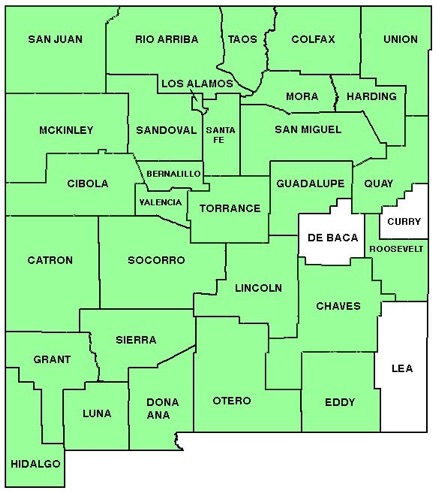WILDFLOWERS OF NEW MEXICO

Also called Tree Cholla, these 3–9-foot tall, distinctive cacti dot the eastern plains, Chihuahua Desert scrublands, and high desert plateaus of NM. The woody base branches into a dense bush of segmented stems lined with rounded ridges of tubercles with clusters of stiff thorns. The trunks reach 10-inches in diameter (rarely). Note the thorny, jointed segments are 10–15 3/4-inches long and 3/4–1 1/4-inches in diameter. Cattle grazing the high plains and desert grasslands spread the joints which can create cholla “forests.”
FLOWER: April–August (depending on rains). Flowers 3–4-inches wide with brilliant magenta, purplish, pink, or lavender petal-like tepals bloom on stem tips. Numerous greenish-red filaments tipped with yellow anthers surround the cream-colored stigma lobes. The firm, yellow, ridged fruit persists throughout winter.
SPINES: Tubercles mostly 3/4–1 3/8-inches long (20–35 mm) have 8–15 brownish to yellowish spines 3/8–1 1/4-inch long (8–30 mm); spines have a sheath covering easily slipped off. Avoid touching the stem and fruit which have tufts of wicked hair-like, barbed glochid bristles.
HABITAT: Dry sandy, rocky soils of plains, grasslands, desert scrublands, foothills, pinyon-juniper woodlands.
ELEVATION: 4,350–7,800 feet.
RANGE: AZ, CO, KS, NM, OK, TX.
SIMILAR SPECIES: Walkingstick Cholla, C. spinosior, in sw NM, has shorter segments, 2–9 inches long, with tubercles 3/8–5/8-inch long (9–15 mm). Whipple Cholla, C. whipplei, in the western half of NM, has slightly thinner stems and yellow flowers. Much smaller diameter stems distinguish Pencil Cholla, C. leptocaulis and Candle Cholla, C. kleiniae.
NM COUNTIES: Nearly statewide in low- to mid-elevation dry habitats (not reported in Curry, De Baca, Lea counties).

CANE (TREE) CHOLLA CACTUS
CYLINDROPUNTIA IMBRICATA (OPUNTIA IMBRICATA)
Cactus Family, Cactaceae
Perennial Cactus, shrub/tree



THE CONTENTS OF THIS WEBSITE ARE COPYRIGHTED AND CANNOT BE USED
WITHOUT PERMISSION OF GEORGE OXFORD MILLER





Range Map for
Cylindropuntia imbricata
1. Woody, jointed stems with ridges of tubercles with stout spines covered in a loose sheath (upper arrow).
2. Areoles on tubercles have 8–15 spines (lower arrow).


EMAIL ME
Pecos National Historical Park